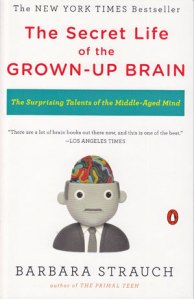It may be possible to grow older in our society while being oblivious to the cultural pressure that aging is Bad, but I’m not the person who will manage it. I counter the pressure by reading books on the topic. Given my tastes, these are usually psychology books, but the latest one came from the medical and psychiatry shelf: The Secret Life of the Grown-up Brain: The Surprising Talents of the Middle-aged Mind by Barbara Strauch. This is a good book if you’re looking for reassurance that all is not lost when you reach middle age. The author strikes a good balance between hard science and a conversational tone seasoned with the occasional personal anecdote. I doubt I’ll remember many of the specifics months from now—not because of my aging memory, but because I tend to race through all books and retain general impressions of them more than details—but it was an encouraging book, although not captivating.

The Secret Life of the Grown-up Brain: The Surprising Talents of the Middle-aged Mind by Barbara Strauch
The Secret Life of the Grown-up Brain is divided into three sections. In the first section, Strauch talks about the ways in which the middle-aged brain shows improvement with age, and in the second section, she moves more into the science of how brains function. The third section is the closest this book gets to self-help, where Strauch presents what scientists think might strengthen the brain as it ages further. It’s this section, especially, that leaves me feeling frustrated as well as reassured. Now some suggestions have stronger support than others (most of this research was pretty new in 2010 when the book was first published), but the conclusion I’m reaching is that if you want a healthy brain in your old age, it helps to be healthy to begin with and have a certain level of socioeconomic resources at your disposal. Money can’t buy a resilient brain any more than it can buy happiness, but it can certainly make it easier for you to strengthen it yourself.
A few examples:
Education: Strauch looks at the relatively new-fangled concept of “cognitive reserve:” the idea that brains can bank resources that can cushion them in the future against the worst effects of aging, maybe even against Alzheimer’s disease. The size of the brain is one factor, and that’s out of your control. But regardless of brain size, scientists believe that education increases your cognitive reserve, and the more education, the better. Now, pause for a moment and consider all the possible obstacles to education. Maybe the organizations which are asking me to urge Congress to reduce student loan rates should argue that if more students can afford college today, there might be fewer cases of dementia decades from now.
Exercise: Well, you can tell where this is going when you see one chapter is called “Keep Moving and Keep Your Wits: Exercise Builds Brains.” We’re introduced to researchers who are concluding that exercise, especially aerobic exercise, stimulates the brain to produce new neurons. But aerobic exercise assumes some advantages on your part. You need to be physically able to jog, or walk briskly, or play tennis, or whatever your chosen form of exercise is. You need the time to do the exercise. You need a safe environment in which to do it. You may need equipment. Even the anecdote that opens the chapter, about a man participating in a study of how exercise affects the brain, mentions that he was “offered free gym membership as part of a research study.” Yes, that’d probably help too.
Mental stimuli: In addition to formal education, continuing to challenge your brain keeps it strong and healthy. Strauch reports that one neuroscientist found that people with complex jobs (often these are the ones where you work with people) were less likely to develop dementia than people who had repetitive jobs with machinery, like on an assembly line. But just because repetitive, dangerous work isn’t good for people doesn’t mean that those jobs will go away—we still want/need to have them done, and often it’s other human beings who have to do them.
Are these obstacles insurmountable? I’d like to say no, but I have enough advantages that most of these aren’t obstacles for me, so how would I know? I’m able-bodied enough to exercise. I was raised by parents who valued education above just about everything else in life and who were able to send me to the college of my choice. That college education got me a job that does offer some mental challenges and pays enough that I don’t have to take extra jobs to supplement my income. That, in turn, leaves me enough time to exercise and do stimulating leisure-time activities like blogging and reading books on middle-aged brains. All of this together, I can hope, will put me in a good position for the decades to come. But that’s me, and yes, that’s many other people with similar or greater advantages than I have, and no, there are no guarantees for any of us. But our chances sound better than many other people’s.
